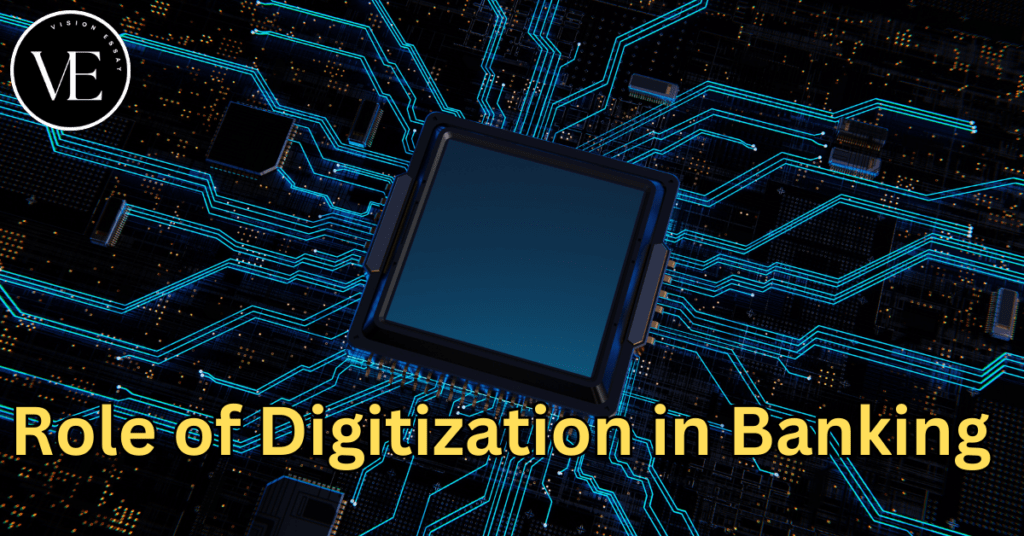Role of Digitization in Banking
Introduction
The journey of digitization in banking begins with the development of computers and the Internet. Banks used paper-based transactions and manual processes at first. A new age of accessibility and convenience was brought about with the development of online banking platforms in the late 20th century, which allowed users to do a variety of banking tasks remotely, including paying bills, transferring money, and checking account balances.
What is the Role of Digitization in Banking?
- Banks play a big part in our everyday lives, not just being a part of them. Many people find that a day cannot conclude without at least one financial transaction.
- So, banks always strive to implement the newest technology to improve the clientele’s experience.
- The banking business will inevitably go digital because this is a trend that is occurring in all industries, including theirs.
- More quickly than internet banking, mobile banking is growing.
What are the Advantages of Digitization in Banking?
- Enhanced experience with customers.
- Reduction of expenses through the use of ATMs, cashless transactions, etc. for both banks and customers.
- Banks may use digital analytics to make data-driven, dynamic choices now that they have access to more digital data. Banks and customers alike gain from this.
- There is no discrimination in technology. In banks, everyone will get the same treatment.
- Because banking is now more convenient, banks will see a growth in their client base.
- Human mistake is reduced by digitalization.
- Handling big sums of cash will become less necessary.
- Bank account opening and upkeep have never been simpler.
- Automation will replace repetitive activities.
- The divide between rural and urban areas will close.
- The threat of counterfeit currency will decrease as cashless transactions increase.
- There will be a rise in productivity.
What are the Disadvantages of Digitization in Banking?
- Because digitalization requires less work from people, jobs are lost as a result.
- The growing popularity of Internet banking may lead to the closure of certain bank locations.
- Cyberattacks will be increasingly likely to target banks.
- There may be a need to sacrifice privacy. Nobody can pretend to be middle class while concealing billions of rupees in banks.
- These drawbacks are just transient. Employment losses will be offset by the development of new positions in fields like cyber security and technological innovation research teams, among others.
- The retail banking sector’s position is changing, not because banks will have less work to do.
Conclusion
It is impossible to overestimate the impact of digitalization on banking. In an increasingly digital world, banks can stay ahead of the curve and competitive by utilizing digital technology to improve client experiences, increase efficiency, and simplify operations. However, banks must handle the difficulties brought on by cybersecurity threats, the need for technical infrastructure, and concerns about regulatory compliance in addition to embracing emerging technologies and adopting a customer-centric approach to innovation if they are to fully reap the benefits of digitalization.
Frequently Asked Questions(FAQs)
What is digitization in banking?
In the banking industry, digitization is the process of using digital technology to increase productivity, optimize processes, and improve client experiences.
What are the benefits of digitization for banks?
For banks, digitization has several advantages, such as better client convenience, cost-effectiveness, heightened security, and higher operational efficiency.
What challenges do banks face in digitizing their services?
When it comes to digitizing their services, banks confront several obstacles, such as the need for technology infrastructure, cybersecurity threats, and regulatory compliance difficulties.
What is the future outlook for digitization in banking?
Banking’s future rests in its continued embrace of digitization and its ability to use cutting-edge technology to provide individualized banking experiences, optimize processes, and spur innovation.
Sources:
- https://timesofindia.indiatimes.com/blogs/voices/how-digitization-is-shaping-the-future-of-banking/
- https://www.weforum.org/agenda/2022/05/heres-how-to-really-reap-the-benefits-of-the-digitalization-in-banking-trend/
- https://www.researchgate.net/publication/333709259_Digitalization_in_Banking_Sector
- https://en.wikipedia.org/wiki/Digital_banking

Leave a Reply